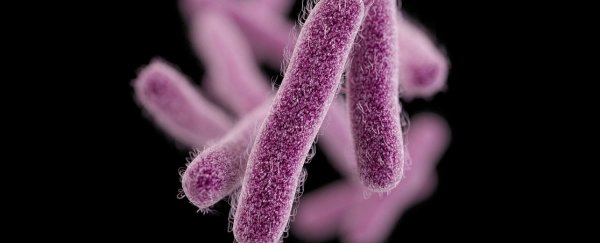A drug-resistant strain of the Shigella bacteria has hit US shores, the Centres for Disease Control and Prevention (CDC) announced last week, and it's already caused a series of severe shigellosis food-poisoning outbreaks around the country.
Shigella is a dysentery-type bacteria that infects your intestines to cause fever, severe stomach cramps, diarrhoea and vomiting, often accompanied by blood, pus or mucus coming out of both ends. The CDC reports that at least 243 people have gotten sick with the bug over the past year in 32 states, and 20 percent of those were hospitalised. The main clusters are in California, Massachusetts and Pennsylvania.
That might not sound like a lot, especially considering the half a million Americans who get regular shigellosis each year, but this strain of Shigella is pretty terrifying because it's resistant to ciprofloxacin - the antibiotic that doctors usually use to treat dysentery.
"If rates of resistance become this high, in more places, we'll have very few options left for treating Shigella with antibiotics by mouth," epidemiologist Anna Bowen, who led the study, told Michaeleen Doucleff over at NPR. The next step is for doctors to resort to IV antibiotics.
Shigella is also extremely contagious, with only 10 germs being needed to be present in food or water spread the infection, Bowen added.
The bug was most likely brought in from travellers visiting India, the Dominican Republic and Morocco, but the drug-resistant strain of shigellosis has now started to be spread within the US.
"Although this Shigella strain is strongly associated with international travel, it is now circulating domestically," the authors of the CDC report wrote. "If introduced to populations of homeless persons, MSM, or children in child care settings, Shigella can spread rapidly and cause large, protracted outbreaks, as has occurred in the homeless population in San Francisco."
But there's no need to start panicking just yet - most of the time the infection should go away on its own after about a week. And, if not, there are still medications that doctors can use to treat this strain. In worst case scenarios, the bacteria can infect other parts of the body and lead to blood infections and even death.
The CDC explains that the best prevention method is simply keeping hands clean and eating well-cooked and hygienically prepared foods, as well as taking anti-diarrhoeal medications if you're travelling.
Stay safe out there, guys.
